|
|
|
Sort Order |
|
|
|
Items / Page
|
|
|
|
|
|
|
| Srl | Item |
| 1 |
ID:
048203
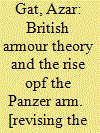

|
|
|
|
|
| Publication |
Houndmills, macmillan Press, 2000.
|
| Description |
xi, 125p.
|
| Standard Number |
0333773489
|
|
|
|
|
|
|
|
|
|
|
|
Copies: C:1/I:0,R:0,Q:0
Circulation
| Accession# | Call# | Current Location | Status | Policy | Location |
| 042911 | 358.18/GAT 042911 | Main | On Shelf | General | |
|
|
|
|
| 2 |
ID:
154681
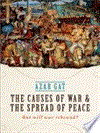

|
|
|
|
|
| Publication |
Oxford, Oxford University Press, 2017.
|
| Description |
xiv, 303p.: ill., diagrams, maps, tableshbk
|
| Standard Number |
9780198795025
|
|
|
|
|
|
|
|
|
|
|
|
Copies: C:1/I:0,R:0,Q:0
Circulation
| Accession# | Call# | Current Location | Status | Policy | Location |
| 059150 | 355.027/GAT 059150 | Main | On Shelf | General | |
|
|
|
|
| 3 |
ID:
071928
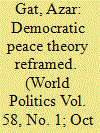

|
|
|
|
|
| Publication |
2005.
|
| Summary/Abstract |
This article argues that the democratic peace theorists have overlooked the defining development that underlies that peace of the nineteenth and twentieth centuries: the industrial-technological revolution. Not only did that revolution make democracy on a country scale possible; it also made all the countries that experienced the revolution-democratic and nondemocratic-far less belligerent in comparison with preindustrial times. The democratic peace did not exist among premodern democratic and republican city-states, not because they were not democratic or liberal enough but because they were premodern. Other factors that have emanated from the modern transformation and may generate greater aversion to war apply mostly to liberal democratic countries while being only variably connected to their regime. Such factors include the staggering rise in the standard of living; the decrease in hardship, pain, and death; the dominance of metropolitan life and the service economy; the spread of the consumer and entertainment society; sexual promiscuity; women's franchise; and the shrinking ratio of young males in the population.
|
|
|
|
|
|
|
|
|
|
|
|
|
|
|
|
| 4 |
ID:
092061
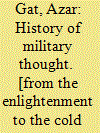

|
|
|
|
|
| Publication |
Oxford, Oxford University Press, 2001.
|
| Description |
xiii, 890p.
|
| Standard Number |
9780199247622
|
|
|
|
|
|
|
|
|
|
|
|
Copies: C:1/I:0,R:0,Q:0
Circulation
| Accession# | Call# | Current Location | Status | Policy | Location |
| 054570 | 355.02/GAT 054570 | Main | On Shelf | General | |
|
|
|
|
| 5 |
ID:
078054
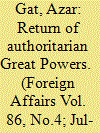

|
|
|
|
|
| Publication |
2007.
|
| Summary/Abstract |
Liberal democracy, led by the United States, may have emerged triumphant from the great struggles of the twentieth century. But the post-Cold War rise of economically successful -- and nondemocratic -- China and Russia may represent a viable alternative path to modernity that leaves liberal democracy's ultimate victory and future dominance in doubt.
|
|
|
|
|
|
|
|
|
|
|
|
|
|
|
|
| 6 |
ID:
092880
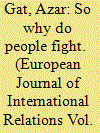

|
|
|
|
|
| Publication |
2009.
|
| Summary/Abstract |
The causes of war remain a strangely obscure subject in the discipline of International Relations. Although the subject is of cardinal significance, theories of International Relations address it only obliquely, and most scholars in the field recognize the lacuna only when their attention is drawn to it. While people have a good idea of the aims that may motivate states to go to war, an attempt at a strict definition of them is widely regarded as futile. This article seeks to show how the various causes of violence and war all come together and are explained within an integrated human motivational complex, shaped by evolution and natural selection. These interconnected causes of fighting - some of them confusedly singled out by various schools in IR theory, most notably within realism - include competition over resources and reproduction, the ensuing quest for dominance, the security dilemma and other prisoner's dilemmas that emanate from the competition, kinship, identity, and ideas.
|
|
|
|
|
|
|
|
|
|
|
|
|
|
|
|
|
|
|
|
|